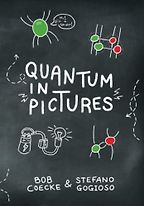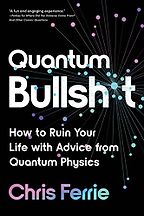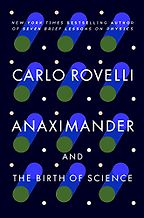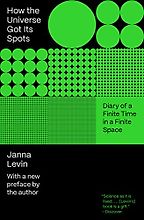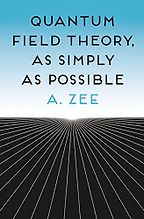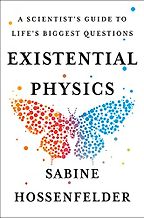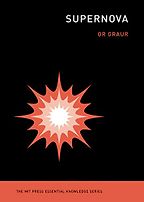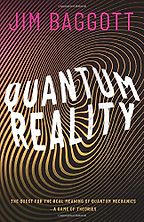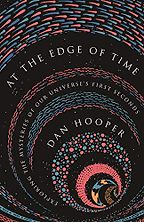New Physics Books
Last updated: February 24, 2023
There are a lot of new physics books being published for a popular audience at the moment, often by very eminent scientists. It's no surprise: it's an exciting time in physics as our knowledge of the universe expands at an impressive rate, while huge installations like the LHC in Geneva reveal details of how particles behave on a minute scale. At the same time, there's a big search on for deeper explanations: relativity doesn't seem to be compatible with quantum mechanics and we have no idea what things like dark matter are.
Please email us if a new physics book you like is missing! [email protected].
Quantum in Pictures: A New Way to Understand the Quantum World
by Bob Coecke & Stefano Gogioso
Even if you never took a physics class, it may not have escaped your notice that there's currently a big conundrum in the discipline, as physicists try to reconcile Einstein's relativity with quantum mechanics. Both describe reality, but they're incompatible. For non-physicists, it's always going to be a battle to understand either, but in Quantum in Pictures Bob Coecke and Stefano Gogioso do their very best: they use pictures. Coecke was, until recently, professor of Quantum Foundations, Logics and Structures at Oxford University and is now Chief Scientist of Quantinuum, a quantum computing company. Gogioso is a computer scientist at the University of Oxford.
NB We also have an interview (from 2019) on the best books to learn about quantum computing.
Quantum Bullsh*t: How to Ruin Your Life with Advice from Quantum Physics
by Chris Ferrie
The number of books coming out on quantum physics right now is testimony to the fact people find it fascinating. As many of us no longer believe in God, why not turn to physics to offer the answer to life, the universe and everything? In this book, Chris Ferrie, a quantum physicist at the University of Technology, Sydney, equips you with a bullshit metre.
Anaximander and the Nature of Science
by Carlo Rovelli
Carlo Rovelli is a theoretical physicist who is brilliant at explaining his field in short books. Anaximander is about a philosopher who lived 26 centuries ago in Miletus, a Greek city on the coast of what is now Turkey. He was the first person to understand that the Earth is just floating in space, and doesn't need to be supported by anything. Anaximander also figured out where rain comes from. "I think it's my best book because it's about what I think science is," Rovelli said at an event at the annual Oxford Literary Festival on 20 January, 2023.
How the Universe Got Its Spots: Diary of a Finite Time in a Finite Space
by Janna Levin
***A new edition of How the Universe Got Its Spots by Americal theoretical cosmologist Janna Levin***
“There’s not another book out there like it. It is truly unique. I read it when I was a postdoc. I read a lot of popular science, but I read this book and thought, ‘this is an entirely different genre of science writing!’ It’s very personal. She interweaves stories about her science and her science research from a first-person perspective with stuff going on in her personal life— her troubles with her relationship or when she feels depressed or lonely. That’s all in the book. You understand more what it is like to be a human being doing science from this book than anything I’ve ever read. I still think it’s profound. I occasionally go back and reread a chapter of it, also just to be inspired as a writer.” Read more...
The Best Books on the Big Bang
Dan Hooper, Physicist
Quantum Field Theory, as Simply as Possible
by A. Zee
Quantum Field Theory, as Simply as Possible is by Anthony Zee, a professor of theoretical physics at the Kavli Institute at UC Santa Barbara. Zee wrote a quantum field theory textbook in 2003, this book is "between a textbook and a popular book as traditionally understood." To understand quantum field theory, you have to understand special relativity and quantum mechanics, so he takes the reader through those quickly first.
“Existential Physics is by Sabine Hossenfelder, a German theoretical physicist and physics popularizer, and is her take on some of the big questions. The book was not easy for me—I had to reread parts—but I loved the opening lines, based on a young man’s question to her. He asked: ‘A shaman told me that my grandmother is still alive. Because of quantum mechanics. She is just not alive here and now. Is this right?’ And Hossenfelder’s response, addressed to the reader: ‘As you can tell, I am still thinking about this. The brief answer is, it’s not totally wrong.'” Read more...
Nonfiction of 2022: Fall Roundup
Sophie Roell, Journalist
Supernova
by Or Graur
In his book Supernova Or Graur, Senior Lecturer in Astrophysics at the Institute of Cosmology and Gravitation at the University of Portsmouth, introduces his field. Graur does research on Type Ia supernovae but has also spent a lot of time doing public education and outreach, including working with high school students. The book is interesting, informative and very clear. It makes you want to go out and look at the night sky.
Quantum Reality: The Quest for the Real Meaning of Quantum Mechanics
by Jim Baggott
Science writer Jim Baggott has devoted his working life to making quantum physics accessible to the rest of us. As he mentions in the preamble, he has been called 'depressingly sane'. He is a strong advocate for a bigger role for philosophy in science, as we reach the limits of what our minds can get our heads around and wild speculation has taken the place of empirical evidence. In this book, he explores the relationship between quantum physics and reality.
At The Edge of Time
by Dan Hooper
At The Edge of Time by astrophysicist Dan Hooper is a popular science book that explains, in lay person's terms, not only what we know out about the universe to date, but also what we don't know about it. "Right now, there’s a culmination of mysteries in cosmology that need to be told as a coherent story," he says in his Five Books interview on the Big Bang. "Maybe we’re in the 1904 of cosmology right now, and we're going to tear down everything we think we know to the ground and build something entirely new."
